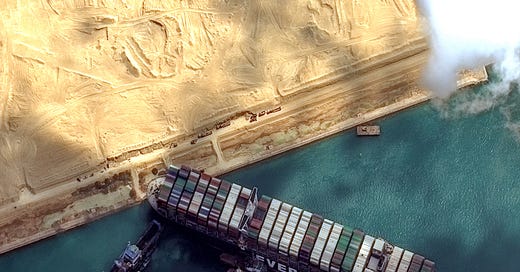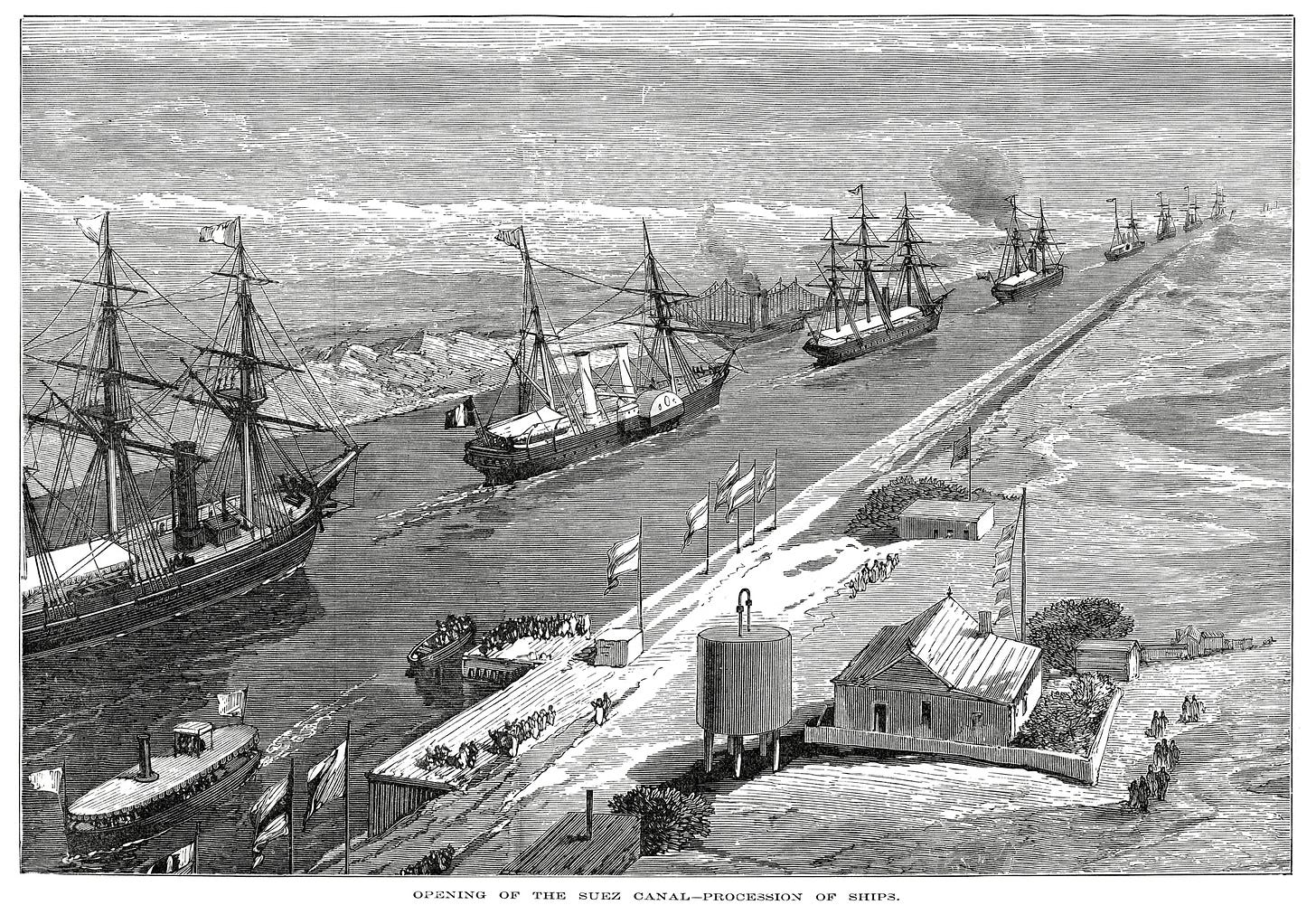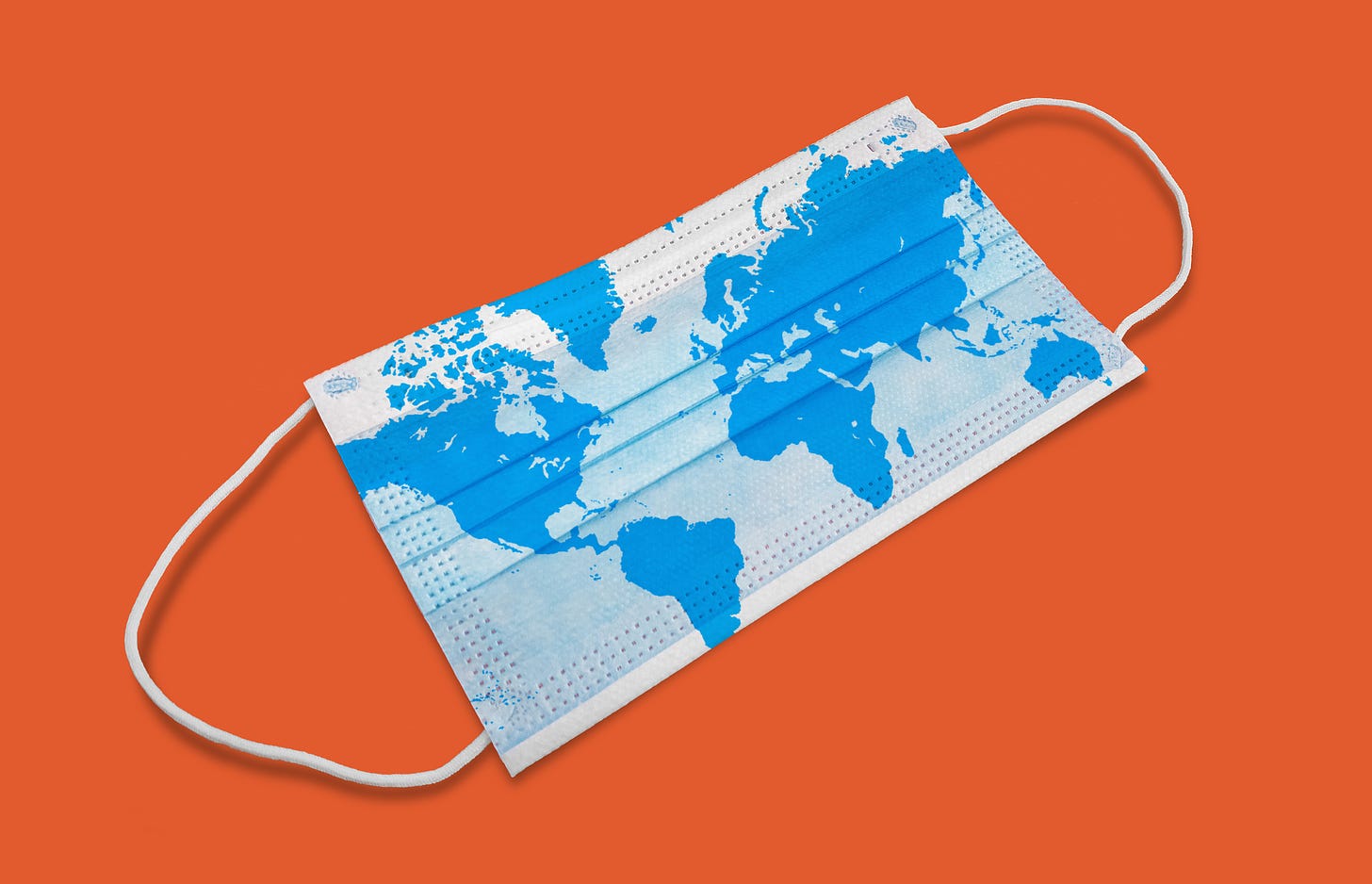A year into a murderous pandemic, during a time when powerful political actors are stoking racial divisions, when the right to vote is under assault, when the Big Lie about the election still threatens our democracy, while war continues in Afghanistan, civil war in Syria, desperate human migrations spread around the globe fleeing terror, economic despair, and the ravages of climate change, when all of this and so much more is happening, who would have thought that the fate of a cargo ship in the Suez Canal would dominate the headlines?
I write the list above, aware of its incompleteness. (What about Myanmar? The gender wage gap? Affordable housing? Etc, etc.) This is not to try to weigh different challenges and crises against each other, but to suggest how precarious our modern world is that something that I frankly hadn’t spent much time thinking about —and I suspect neither did most of you— could wreak such potential havoc and disruption. Who knew that we were but one sideways ship away from bringing global trade to a place of panic? Obviously some people had a job to worry about such things, those who managed the Canal, insured shipping cargoes, and so on. But for most of the world, we buy our goods and think vaguely about trade and commerce without knowing about all the details.
Our world is so interconnected that no one of us can know or prepare for all that could go wrong. Certainly there were many people who were worried about an aerosolized deadly virus and were sounding alarms for years. Our government —and indeed all of us— should have been better prepared. Just as we should be better prepared for climate change, or protecting our digital devices, or driving more safely.
Modern science has given us more knowledge about many threats. We understand diseases better for instance, even if we cannot produce cures for many. And technology has provided ways to protect us from some of the threats posed by those very same technologies —airbags for our cars, for example. But even as we try to know more and prepare better, the systems that prop up our existence are complex and create their own weaknesses.
Over the course of my lifetime I have seen our world shrink in many profound ways. Not literally of course, but in terms of how people move, communication spreads, threats emerge. I remember the rise of the atomic bomb, with the prospects of an entire city being vaporized in an instant. Then came intercontinental ballistic missiles, with the notion that that city, and indeed entire nations, could be destroyed in a matter of minutes from the other side of the world. I remember the beginning of jet travel, and how distant locations could be reached easily, safely, and eventually pretty affordably in a matter of hours. I remember the rise of television when images suddenly came into your home, and satellite communication, when you could go “live” from almost anywhere. The internet brought instantaneous information, and democratized its spread. The mobile phone allows us to access that information from anywhere. And social media has bundled and extrapolated communication in ways none of us could have fully predicted.
For most of human existence, of course, life was very different. We lived much closer to the land. We understood our environment with a deep, tangible knowledge. It was a matter of life and death. We knew what we could eat and what was poisonous. We had to figure out how to hunt for our food and protect ourselves against the elements. The understandings that we gained and shared across the generations were nuanced, detailed and profound. It was the same innate human curiosities that built our modern world, the drive to experiment and learn that allowed humans to thrive in regions as distinct as the Amazon rainforest, the Kalahari Desert and the Arctic tundra. Tragically, in an age of brutal colonization, this native expertise was far too often dismissed as primitive, uncivilized and unscientific. As a result a great amount of hard-won knowledge has been lost.
In our documentary Human Nature about the gene editing revolution of CRISPR we traveled to an archeological dig in Turkey that dated back to the early days of human agriculture. The scientists there talked about an era of great innovation, the ingenuity it took to not only figure out how to plant and harvest seeds but to make such things as bricks for building their houses. Agriculture has often been described as an unmitigated good. It allowed for the rise of civilizations and all that that brings. But the scientists in Turkey also had a sense of caution. Agriculture has also brought global environmental destruction. It has allowed for a population surge that threatens the very health of this planet. It creates a world where a new virus that might have infected a few people in an isolated hamlet and then die out can spread around the world in a matter of weeks.
I am not arguing for a return to some mythic hunter and gatherer past. That is of course impossible and undoubtedly had its own problems. I am instead reflecting on how we need to consider more the complexity of our world and to measure the risks that something, even something as small as one cargo ship (albeit a very big cargo ship) could go wrong. We can endeavor to embrace technologies that decrease these risks. Think about something like our energy. We pump oil in places like the deep sea, transport it on tanker ships and through pipelines, refine it and truck it to gas stations to put into cars that literally burn it. Now consider a house equipped with solar panels and an electric car with far fewer moving parts. How much less could go wrong in the second scenario? And that’s not even factoring in climate change or geopolitics.
The response of the previous administration to the pandemic was a version of close our eyes, cover our ears, and hope things work out. Well it didn’t. We are vulnerable in ways predictable and unforeseen. Our warming world will make those vulnerabilities all the more dangerous. We need to design for resilience, prepare for the unexpected, and recognize, with humility, that as smart as we think we are, as sophisticated and prepared, there is a lot more that we need to be doing.
—Dan
Please consider subscribing to STEADY, if you have not already. Our goal is to build a vibrant digital community —the more voices, perspectives, and viewpoints that can add to the conversation, the merrier.






As I was reading your letter and you talked about how many changes you have seen I was reminded of my late cousin who passed five years ago. He saw the world change more profoundly than many of us ever will. He went from horse and buggy to electric vehicles, coal/wood heat to solar(which he embraced much earlier than most), local mail delivery to email and the beginning of flight to space travel. Through all those changes he maintained a cheerful loving spirit and a love for the world and all her people coupled with a desire to serve. I wish we all could find that same sort of philosophy and we struggle with the changes we have wrought on this world and for all , animal and human who inhabit this small sphere.
As I read this, I was reminded of the "butterfly effect". Very small things can make a huge difference in our world.